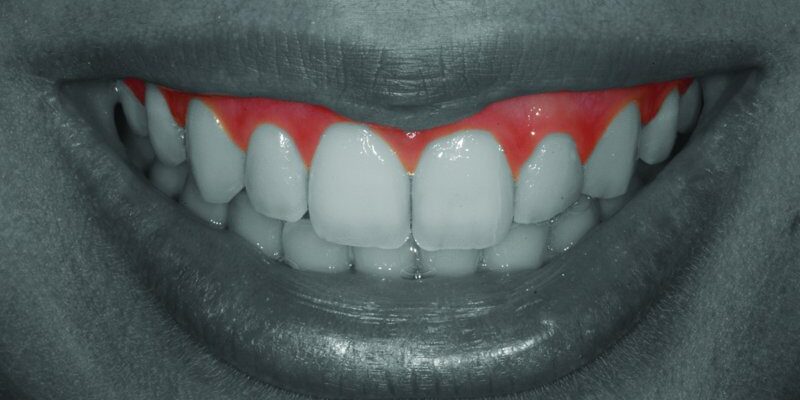– Dr. Sejal Shah
“Beauty lies in the mind, comes out through eyes to enter in the heart”

Introduction
In this era of esthetic dentistry, where beauty holds a prime importance among the masses in the society, sculpturing a dazzling smile is an art. “Beauty is in the eye of the beholder” – this famous idiom has lots to convey. Can we behold the eye to the teeth only??? How can we forget the gingiva in our patients? Zenith point is the most apical position of the cervical tooth margin where the gingiva is most scalloped. It is located slightly distal to the vertical line drawn down the center of the tooth.

Smile line arrangement is not a subject that purely can be solved with changes in dentition. Gingival esthetics also plays a big role here. An individual tooth is inseparable from the adjacent gingiva. The interface between tooth and soft tissues is of critical importance for achieving better esthetics. Patient’s gingival esthetics contribute to an improved self image and enhanced self – esteem. This paper outlines the path trodden by man in dental esthetics and the prospects that future holds.
The clinical significance of gingival zenith will allow clinicians to reestablish the proper intra-tooth gingival zenith points of the maxillary anterior teeth during periodontal crown lengthening or root coverage procedures. In addition, the intra-arch gingival level of the lateral incisor gingival zenith relative to the adjacent central and canine teeth should be appropriately established.

Case Report
A 25 year old male patient reported to the dental office, with chief complaint of missing anterior tooth. The extra oral view shows missing 22 (Image 4).

The preparations of teeth no. 21, 23 for a 3 unit E. max bridge was done (Image 5). Notice the difference in gingival zenith here. The patient did not wish to undergo a root coverage procedure, and hence a gingival prosthesis along with the bridge was planned.

The Impressions were made and sent to the dental lab. Dental lab sent computerised view of 3 -unit imprint and then made final prostheses (Image 6).

The final prostheses with gingival prostheses cemented into patients mouth, who was very happy with the results (Image 7 ). Patient was instructed to maintain strict oral hygiene and undergo localised professional scaling every 3-4 months.

Discussion – To Do Or Not To
Details such as the GZP (Gingival Zenith Point), the most apical point of the free gingival margin of the periodontium, and the GZL (Gingival Zenith Length) of the lateral incisor relative to the central incisors and canine teeth can significantly influence the esthetic appearance of a smile.
However, these studies, though discussing various aspects related to the gingival contours of the maxillary anterior teeth, have presented conflicting information on where the GZP should be. The appropriate placement of the gingival zenith is critical, as it helps to determine the desired axial inclination of the tooth by maneuvering the line angle of the tooth vertical axis. Subsequently, knowing the GZP of each maxillary anterior tooth from the VBM (vertical bisected midline) as well as the GZL of the lateral incisors can help facilitate a reference point during esthetic periodontal plastic surgery procedures.
Summary
The interface between tooth and soft tissues is of critical importance for achieving better esthetics.
“Inform before you perform. No surprises!”
Patient’s gingival aesthetic contribute to an improved self image and enhanced self – esteem.
Don’t change what is right to fix what is wrong. – Peter E. Dawson.
References
1) Solomon EGR: Esthetic consideration of smile; J of IPS 1999: 10(3&4); 41-47.
2) Goldstein, RE: Change your Smile, ed 3 Chicago, Quintessence, 1997.
3) Masters Of Esthetic Dentistry Objective Criteria: Guiding And Evaluating Dental Implant Esthetics Journal Compilation 2008, Wiley Periodicals, Inc. Volume 20 , Number 3 , 195-205.
4) Peter E, Dawson: From functional occlusion to smile design.
5) Sudhindra Kulkarni, Srinath Thakur, Sampath Kumar – Immediate Loading of Dental Implant s with Provisional Restorations and Soft Tissue Manipulation for Achieving Optimal Esthetics: A case report. The Journal of Implant and Advanced Clinical Dentistry; 2010-2011: 75-81.
FAQs
What is gingival zenith, and why is it important?
Gingival zenith is the highest point on the gum line of a tooth, where it meets the enamel. It is an essential factor in achieving optimal dental aesthetics, as a well-placed gingival zenith can create an even, symmetrical gum line that enhances the appearance of the teeth.
How is the gingival zenith determined?
The gingival zenith is determined by the position of the tooth in the jawbone and the contour of the gum tissue surrounding it. Factors such as tooth size, shape, and position can all influence the location of the gingival zenith.
What is collar preparation in dentistry?
Collar preparation refers to the process of creating a collar-shaped band of tooth structure around a prepared cavity. This technique helps to ensure that the filling or restoration will be properly sealed and will not leak or break down over time.
What is the ideal gingival zenith position?
The ideal position for the gingival zenith is typically around 1-2 millimeters below the point where the tooth meets the gum tissue. However, this can vary depending on the individual tooth and the surrounding gum tissue.
Can gingival aesthetics be improved with cosmetic dentistry?
Yes, there are several cosmetic dentistry procedures that can improve the appearance of the gingival zenith and enhance overall gingival aesthetics. These may include gum contouring, veneers, and orthodontic treatments such as Invisalign.




















Comments